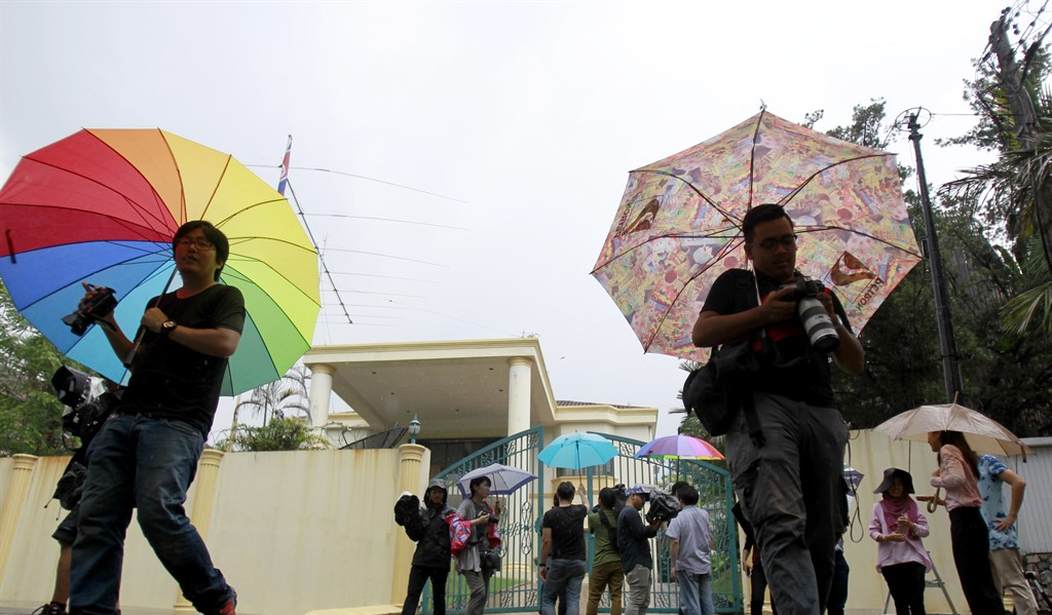They may not be friends again, but at least they’re not holding hostages any longer. Malaysia and North Korea have resolved a bitter standoff in the aftermath of an assassination of Kim Jong-un’s brother in Kuala Lumpur’s airport. Pyongyang gets the body of Kim Jong-nam, and both sides get their own citizens back:
The body of Kim Jong-Nam will be returned to North Korea and nine Malaysians in Pyongyang allowed to leave under a deal struck between the two countries, Malaysia Prime Minister Najib Razak said Thursday.
North Korean citizens in Kuala Lumpur will also be allowed to return home, Najib said in a statement, which was confirmed by North Korean state media.
“… following the completion of the autopsy on the deceased and receipt of a letter from his family requesting the remains be returned to North Korea, the coroner has approved the release of the body,” said Najib.
As trades go, this one ain’t exactly Lou Brock for Ernie Broglio, but it’s not a great look for either country. It’s more like an equal hostage swap with a corpse to be named later. It’s still curious as to why Malaysia agreed to send the body to Pyongyang at all. Kim Jong-nam hadn’t lived there in almost two decades, and his family — apart from his brothers — was in China, not North Korea. According to the AFP’s report, Malaysia had held the body pending a claim from Jong-nam’s next of kin. The assassination took place six weeks ago; did the family choose not to claim the body? Did Malaysia and/or China dissuade them from doing so?
Getting the body back of a man that they had assassinated might seem like a strange request, but Pyongyang wants the opportunity to conduct their own autopsy and declare themselves innocent. The length of time since the murder through VX nerve agent, plus the obvious conflicts of interest, will make that claim ridiculous, but it offers an opportunity to close a public-relations loop. As Reuters notes, this is hardly a whodunit:
Kim Jong Nam’s murder was remarkably public, according to North Korea analysts. The assassins chose an airport covered by CCTV cameras and a designated weapon of mass destruction possessed by only a few states, North Korea among them.
“The effect had to be planned,” said Robert L. Gallucci, a former U.S. chief negotiator with North Korea over its nuclear program. “They wanted to underline impunity, that they can act with impunity.”
The brazen nature of the assassination also made collecting evidence relatively easy. After the first chaotic day, the investigation was taken over by Malaysia’s Special Branch – which combines the roles of elite police unit and domestic intelligence agency.
The investigation has not yet concluded, either. Malaysian police want to question at least three North Korean nationals for their role in the plot, two of whom are still inside the North Korean embassy in Kuala Lumpur. Police are patrolling outside of the embassy, but the formerly friendly nations are not on speaking terms other than the exchange of hostages. That may present Malaysia with some diplomatic headaches, but it’s an economic crisis for the North Koreans, who relied heavily on Malaysian contacts to evade UN sanctions. Malaysia had an opportunity to remind Pyongyang about that yesterday:
Malaysia briefly prevented a North Korean ship carrying coal from entering its port in Penang because of a suspected breach of United Nations sanctions, a port worker and Malaysian maritime officials told Reuters on Wednesday
The KUM YA, was carrying 6,300 metric tonnes of anthracite coal, according to a worker at Penang Port who spoke to Reuters on condition of anonymity. It was later allowed to dock, where an inspection team accompanied by an armed escort boarded the ship. …
The Malaysian Maritime Enforcement Agency (MMEA) confirmed the ship had been stopped following instructions from Malaysia’s foreign ministry, which did not immediately respond to requests for comment.
“Many North Korean ships call on our ports and we never had problems. Just over the recent months, there have been problems,” the port worker told Reuters. “We have never received directives to stop North Korean ships before.”
Call that a shot across the bow. The days of safe passage through Malaysia may be over, and with it a key financial conduit to hard currency for Pyongyang. The North Koreans aren’t the only ones demonstrating the ability to act with impunity.








Join the conversation as a VIP Member